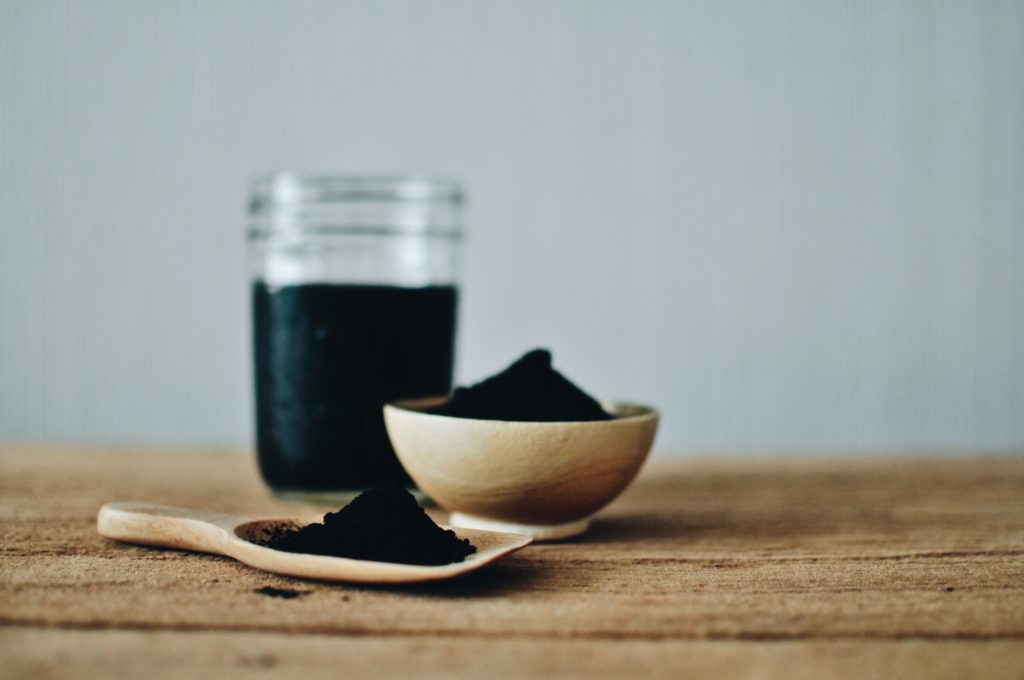10 Health Benefits of Activated Charcoal
There’s a new charcoal in town, and it isn’t for grilling.
You’ll be surprised to know that this type of charcoal—referred to as activated charcoal—is actually a medicinal product that can be used as a remedy for a number of popular conditions. Before we delve into the benefits of using it, however, let’s go over exactly what it is that makes this charcoal different from the kind used for grilling burgers.
What is Activated Charcoal?
To be clear, activated charcoal is not the same as barbecue charcoal, which is filled with chemicals and toxins (unless you buy natural, of course) and should never be eaten.
Activated charcoal is a type of charcoal that has been used for thousands of years as a medicinal product, dating as far back as early Egypt. (1) It is made from various natural materials, including coconut shells, burnt wood, or peat, which are treated with oxygen to create a porous surface. However, this porous surface is no ordinary surface: it contains a negative electric charge that binds to and traps positively-charged toxins, drugs, chemicals, and even some bacteria in order to remove them from the body.
This process is referred to as adsorption (different from absorption), an extremely powerful chemical reaction that causes elements to bind to the surface of activated charcoal. It also allows activated charcoal to expand more than three times its size in order to bind toxins in its environment. (2)
Top 10 Benefits and Uses of Activated Charcoal
Today the power of activated charcoal is used not only internally to cleanse the body of toxins, but also topically for the skin, as a water filter, and much, much more. Read on to discover the top 10 ways it can benefit your health and your environment.
1. Remove Toxins
The most common use for activated charcoal is to remove toxins, both in emergency situations and everyday chemical exposure. Studies have shown that activated charcoal is able to adsorb most harmful organic compounds, toxic metals like mercury, pesticides, medications, and other chemical poisons very efficiently, drawing them out of the digestive system before they have a chance to be absorbed into the bloodstream. (3) One study even showed that activated charcoal was better able to remove excess aspirin in an aspirin overdose than stomach pumping. (4,5)
If you suspect you may have ingested something dangerous (of course, call 911 first) experts recommend a dosage of 50 to 100 grams for adults and 10 to 25 grams for children. If you’re looking to simply detox excess pesticides from a bad diet or other gases/substances you’ve come into contact with, follow the dosage instructions for everyday use on your bottle or package.
Because charcoal can carry out good substances as well as bad, it’s best not to use it as a detox nutritional supplement unless you’ve been advised to by a nutrition or medical professional.
2. Stop Gas and Bloating
Interestingly, activated charcoal may be one of the best remedies you can use to get rid of gas and bloating. One study showed that compared to a placebo, activated charcoal was able to significantly reduce gas levels, bloating, and abdominal cramps in participants by binding to the gas-producing elements in their guts. (6)
To alleviate gas and bloating, take 500 milligrams of activated charcoal with a large glass of water roughly an hour before your meal.
3. Filter Water
As you may know, tap water is filled with hundreds of toxic impurities ranging from fluoride to narcotics and chlorine. This is why finding the right water filtration system is such an important step in starting a healthy lifestyle.
Luckily, activated charcoal is actually one of the most widely used substances to filter water in systems around the world. As mentioned earlier, it has the ability to trap chemicals like medications and fluoride, to a certain extent, in order to produce clean water. (7) If you’re looking for a new filtration system, keep in mind that another name for charcoal filters is “activated carbon” filters.
4. Whiten Teeth
The adsorption abilities of activated charcoal can help you get whiter teeth by drawing out the impurities, plaque, and microscopic tidbits that are responsible for stains.
Charcoal can, however, stain crowns and caps, so if you have these you may want to avoid using it as a dental product. Otherwise, a simple whitening regime is to dip a wet toothbrush into a little charcoal powder and brush like normal. Let sit for a couple minutes then swish with water and spit. Be sure to clean up any excess from your sink or countertops, as it will stain those, too.
5. Prevent Hangovers
Activated charcoal can help prevent hangovers, not by removing the alcohol itself, but by binding to the toxic chemicals that come with most alcohol: toxic sweeteners and chemical flavorings.
While there is limited research on whether activated charcoal can be used to treat alcohol poisoning, one study found that when activated charcoal is taken with alcohol, it can significantly lower blood alcohol levels. (8)
6. Acne and Skin Health
Activated charcoal face masks are all the rage these days, and for good reason: when it comes into contact with the skin, it draws out impurities from the pores like dirt, oil, and chemicals from makeup, which can have a huge impact on acne.
To make an activated charcoal mask, simply add two teaspoons of charcoal powder to fresh aloe vera gel and spread over your face, letting it sit until it dries. Alternatively, you can mix bentonite clay with raw honey and ½ teaspoon of activated charcoal and let dry before washing off.
7. Kidney and Liver Health
Our bodies are constantly attempting to remove and filter out environmental toxins that we are exposed to on a daily basis. An overload of these toxins can easily result in placing a burden on the organs that are responsible for their removal: the kidneys and liver.
Activated charcoal aids the body in removing toxins by binding them before they can do damage to organs, thus lessening the workload of the detox system. Studies have shown that supplementing with charcoal has helped end-stage renal disease patients control their symptoms and avoid emergency dialysis while lowering urea and creatinine levels. (9)
8. Lower Cholesterol
Research shows that activated charcoal can help significantly reduce cholesterol levels. One study found that patients with high cholesterol who were treated with activated charcoal for four weeks ended up with a total and LDL cholesterol drop of between 25 and 41 percent. (10)
The patients in the study were prescribed eight grams of activated charcoal three times per day. If you do decide to try activated charcoal to lower your cholesterol levels, remember not to take it within two hours of any other prescription medication, and as always, it’s best to have medical professional feedback on your supplement routine to ensure no interactions or negative effects.
9. Reduce Inflammation
Typically when we are wounded or sick, the body responds with inflammation. While this is sometimes used to help treat the problem, when inflammation markers get too high, tissue damage and even shock or death can occur. In these situations, it may be useful to consider activated charcoal as a treatment, as studies have shown that it has the ability to remove pro-inflammatory cytokines from the blood. (11) This may be especially helpful for those with inflammatory diseases like rheumatoid arthritis.
10. Bug Bites
Many people swear by the ability of activated charcoal to help relieve the pain and itchiness that comes with bug bites. While you should always go to the doctor if you think you may have been bitten by something poisonous, it wouldn’t hurt to try out activated charcoal on any mosquito or other minor bites that you may have.
Simply mix a capsule or ½ a teaspoon with a little coconut oil and dab it on the bite. Reapply every 30 minutes and be sure to wrap it with a bandage if you plan on moving around since charcoal can stain surfaces.
Where to Get Activated Charcoal
Not all activated charcoal products are the same. Your best bet is to look for charcoal made from coconut shells or wood and to check the ingredient list to make sure there are no added artificial sweeteners or other ingredients. If your local health food store doesn’t have activated charcoal, you can check online to find a quality powder.
Bottom Line
If you do decide to use activated charcoal internally, be sure to consume more water than normal, since dehydration can occur if you’re not careful. Think 12 glasses of water instead of the standard eight while ingesting charcoal. Doing this will also help flush excess toxins faster.
While the research is still ongoing when it comes to the benefits of activated charcoal, most of these studies show a clear positive to adding activated charcoal into your daily routine. Check with your provider for customized recommendations for how to use this natural detoxing agent in your wellness plan.
The post 10 Health Benefits of Activated Charcoal appeared first on PaleoPlan.
from PaleoPlan http://ift.tt/2EVyUqY
Entry Published : February 26, 2018 at 03:30PM
EntryContent :
There’s a new charcoal in town, and it isn’t for grilling.
You’ll be surprised to know that this type of charcoal—referred to as activated charcoal—is actually a medicinal product that can be used as a remedy for a number of popular conditions. Before we delve into the benefits of using it, however, let’s go over exactly what it is that makes this charcoal different from the kind used for grilling burgers.
What is Activated Charcoal?
To be clear, activated charcoal is not the same as barbecue charcoal, which is filled with chemicals and toxins (unless you buy natural, of course) and should never be eaten.
Activated charcoal is a type of charcoal that has been used for thousands of years as a medicinal product, dating as far back as early Egypt. (1) It is made from various natural materials, including coconut shells, burnt wood, or peat, which are treated with oxygen to create a porous surface. However, this porous surface is no ordinary surface: it contains a negative electric charge that binds to and traps positively-charged toxins, drugs, chemicals, and even some bacteria in order to remove them from the body.
This process is referred to as adsorption (different from absorption), an extremely powerful chemical reaction that causes elements to bind to the surface of activated charcoal. It also allows activated charcoal to expand more than three times its size in order to bind toxins in its environment. (2)
Top 10 Benefits and Uses of Activated Charcoal
Today the power of activated charcoal is used not only internally to cleanse the body of toxins, but also topically for the skin, as a water filter, and much, much more. Read on to discover the top 10 ways it can benefit your health and your environment.
1. Remove Toxins
The most common use for activated charcoal is to remove toxins, both in emergency situations and everyday chemical exposure. Studies have shown that activated charcoal is able to adsorb most harmful organic compounds, toxic metals like mercury, pesticides, medications, and other chemical poisons very efficiently, drawing them out of the digestive system before they have a chance to be absorbed into the bloodstream. (3) One study even showed that activated charcoal was better able to remove excess aspirin in an aspirin overdose than stomach pumping. (4,5)
If you suspect you may have ingested something dangerous (of course, call 911 first) experts recommend a dosage of 50 to 100 grams for adults and 10 to 25 grams for children. If you’re looking to simply detox excess pesticides from a bad diet or other gases/substances you’ve come into contact with, follow the dosage instructions for everyday use on your bottle or package.
Because charcoal can carry out good substances as well as bad, it’s best not to use it as a detox nutritional supplement unless you’ve been advised to by a nutrition or medical professional.
2. Stop Gas and Bloating
Interestingly, activated charcoal may be one of the best remedies you can use to get rid of gas and bloating. One study showed that compared to a placebo, activated charcoal was able to significantly reduce gas levels, bloating, and abdominal cramps in participants by binding to the gas-producing elements in their guts. (6)
To alleviate gas and bloating, take 500 milligrams of activated charcoal with a large glass of water roughly an hour before your meal.
3. Filter Water
As you may know, tap water is filled with hundreds of toxic impurities ranging from fluoride to narcotics and chlorine. This is why finding the right water filtration system is such an important step in starting a healthy lifestyle.
Luckily, activated charcoal is actually one of the most widely used substances to filter water in systems around the world. As mentioned earlier, it has the ability to trap chemicals like medications and fluoride, to a certain extent, in order to produce clean water. (7) If you’re looking for a new filtration system, keep in mind that another name for charcoal filters is “activated carbon” filters.
4. Whiten Teeth
The adsorption abilities of activated charcoal can help you get whiter teeth by drawing out the impurities, plaque, and microscopic tidbits that are responsible for stains.
Charcoal can, however, stain crowns and caps, so if you have these you may want to avoid using it as a dental product. Otherwise, a simple whitening regime is to dip a wet toothbrush into a little charcoal powder and brush like normal. Let sit for a couple minutes then swish with water and spit. Be sure to clean up any excess from your sink or countertops, as it will stain those, too.
5. Prevent Hangovers
Activated charcoal can help prevent hangovers, not by removing the alcohol itself, but by binding to the toxic chemicals that come with most alcohol: toxic sweeteners and chemical flavorings.
While there is limited research on whether activated charcoal can be used to treat alcohol poisoning, one study found that when activated charcoal is taken with alcohol, it can significantly lower blood alcohol levels. (8)
6. Acne and Skin Health
Activated charcoal face masks are all the rage these days, and for good reason: when it comes into contact with the skin, it draws out impurities from the pores like dirt, oil, and chemicals from makeup, which can have a huge impact on acne.
To make an activated charcoal mask, simply add two teaspoons of charcoal powder to fresh aloe vera gel and spread over your face, letting it sit until it dries. Alternatively, you can mix bentonite clay with raw honey and ½ teaspoon of activated charcoal and let dry before washing off.
7. Kidney and Liver Health
Our bodies are constantly attempting to remove and filter out environmental toxins that we are exposed to on a daily basis. An overload of these toxins can easily result in placing a burden on the organs that are responsible for their removal: the kidneys and liver.
Activated charcoal aids the body in removing toxins by binding them before they can do damage to organs, thus lessening the workload of the detox system. Studies have shown that supplementing with charcoal has helped end-stage renal disease patients control their symptoms and avoid emergency dialysis while lowering urea and creatinine levels. (9)
8. Lower Cholesterol
Research shows that activated charcoal can help significantly reduce cholesterol levels. One study found that patients with high cholesterol who were treated with activated charcoal for four weeks ended up with a total and LDL cholesterol drop of between 25 and 41 percent. (10)
The patients in the study were prescribed eight grams of activated charcoal three times per day. If you do decide to try activated charcoal to lower your cholesterol levels, remember not to take it within two hours of any other prescription medication, and as always, it’s best to have medical professional feedback on your supplement routine to ensure no interactions or negative effects.
9. Reduce Inflammation
Typically when we are wounded or sick, the body responds with inflammation. While this is sometimes used to help treat the problem, when inflammation markers get too high, tissue damage and even shock or death can occur. In these situations, it may be useful to consider activated charcoal as a treatment, as studies have shown that it has the ability to remove pro-inflammatory cytokines from the blood. (11) This may be especially helpful for those with inflammatory diseases like rheumatoid arthritis.
10. Bug Bites
Many people swear by the ability of activated charcoal to help relieve the pain and itchiness that comes with bug bites. While you should always go to the doctor if you think you may have been bitten by something poisonous, it wouldn’t hurt to try out activated charcoal on any mosquito or other minor bites that you may have.
Simply mix a capsule or ½ a teaspoon with a little coconut oil and dab it on the bite. Reapply every 30 minutes and be sure to wrap it with a bandage if you plan on moving around since charcoal can stain surfaces.
Where to Get Activated Charcoal
Not all activated charcoal products are the same. Your best bet is to look for charcoal made from coconut shells or wood and to check the ingredient list to make sure there are no added artificial sweeteners or other ingredients. If your local health food store doesn’t have activated charcoal, you can check online to find a quality powder.
Bottom Line
If you do decide to use activated charcoal internally, be sure to consume more water than normal, since dehydration can occur if you’re not careful. Think 12 glasses of water instead of the standard eight while ingesting charcoal. Doing this will also help flush excess toxins faster.
While the research is still ongoing when it comes to the benefits of activated charcoal, most of these studies show a clear positive to adding activated charcoal into your daily routine. Check with your provider for customized recommendations for how to use this natural detoxing agent in your wellness plan.
The post 10 Health Benefits of Activated Charcoal appeared first on PaleoPlan.
via IFTTT





No comments: